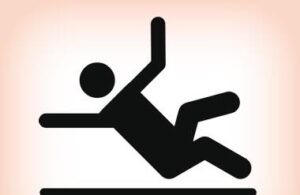Be Careful That You Don't Fall
The Picture of Sin
Being "On Time" For Worship



[1Co 10:12 NKJV] 12 Therefore let him who thinks he stands take heed lest he fall.
[1Co 10:12 NIV] 12 So, if you think you are standing firm, be careful that you don't fall!
The devil wants to steal your ticket to heaven. That is to say, the devil is trying to lure you away from God. He wants you to turn your back on the Savior. He wants you to walk away forever from God. Now brethren, if we can understand how he goes about getting us to do this, then you and I can better stay out of his reach. Let's look at this verse again, preparing us for the lesson today. [1Co 10:12 NIV] 12 So, if you think you are standing firm, be careful that you don't fall!
Continue Reading....
Forgiveness and healing

“When he entered Capernaum again after some days, it was reported that he was at home. So many people gathered together that there was no more room, not even in the doorway, and he was speaking the word to them. They came to him bringing a paralytic, carried by four of them. Since they were not able to bring him to Jesus because of the crowd, they removed the roof above him, and after digging through it, they lowered the mat on which the paralytic was lying. Seeing their faith, Jesus told the paralytic, ‘Son, your sins are forgiven.’” (Mark 2:1-5, CSB)
As is typical of Jesus’ miracles, the one Jesus would perform on this occasion points to a greater kind of healing. But before Jesus healed this man physically, He showed what it meant. He healed him spiritually by forgiving his sins. This led to the scribes questioning how Jesus could do this because only God can forgive sins. Jesus knew what they were thinking, so He responded:
“Why are you thinking these things in your hearts? Which is easier: to say to the paralytic, ‘Your sins are forgiven,’ or to say, ‘Get up, take your mat, and walk’? But so that you may know that the Son of Man has authority on earth to forgive sins” — he told the paralytic — “I tell you: get up, take your mat, and go home.” (vv. 8-11)
In order to demonstrate Jesus’ power to forgive sins, He healed the man physically. Yet what Jesus showed here is that the physical healing was not an end in itself. The point was that there is a greater healing that only He can accomplish. His miracles demonstrate that in some way His power transcends the physical and impacts the spiritual.
We all need healing. Even if we are not healed physically of some ailment or problem, we still need the spiritual healing that only Christ can give. This is because humanity is broken due to sin, and the answer to the problem of sin, while involving what Jesus did physically (even on the cross), transcends the physical.
When Jesus healed the disabled man in John 5, He told him, “See, you are well. Do not sin anymore, so that something worse doesn’t happen to you” (v. 14). The physical healing was a wonderful blessing, but Jesus had a greater point to make. Sin breaks us in ways that will result in something far worse than a physical ailment. When Jesus asked that man, “Do you want to get well?” (v. 6), there were greater implications than whether he wanted physical healing. If we really want to get well, then we will seek His forgiveness and want to leave behind sin.
There is something else to consider. Understanding the brokenness of humanity is rooted in the recognition that there is a unifying standard by which everything else is measured. If there is no such standard, then thinking that anything or anyone is broken is arbitrary and meaningless. One might think that perhaps there is nothing broken, that things just are as they are (which is the case if we are products of mindless, purposeless, accidental, chance processes). If that is so, then let us not hear talk of immoral behaviors, injustices, harassment, abuse, moral outrage, or anything else that would indicate that something is not as it should be. If things are not as they should be, then something is amiss, which means there must be a standard that is being violated. That standard, in turn, must be ultimately significant or else it loses its gravitas and we are back to no true standard. We cannot consistently deny that there is an ultimate standard, then act as though some great standard is being violated.
We know better. We know something is not right, and if something is not right, we know there is something else to which we are accountable that is right. There is only one standard that can be ultimate, that is contingent on nothing else, and to which all can and will be accountable, and this is the One we call God.
Back in Mark 2, Jesus shows that He came in the flesh to bring healing and forgiveness. Yet in this miracle, He also demonstrated that He is indeed God. In this the scribes were correct — only God can forgive sins. Jesus did just that. He did not perform miracles just like any other miracle-worker who then pointed back to God. He did them as a demonstration that He is God in the flesh and that He has power to forgive sins because of who He is.
We are the ones in need of what Jesus offers. He proved He can forgive sins, and He consistently showed that there are worse things that can happen than physical ailments. We need to make sure we are ready to receive His grace and forgiveness. Will we, like the paralyzed man in Mark 2, demonstrate our faith by coming to Jesus?
The saying goes that life imitates art, though it can rather be debated that art is more created as an imitation of life. It is not difficult to see that what is created as art often mirrors or shadows what happens in reality, for good or ill. Human beings try to create their own forms of beauty through art, and sometimes they capture a reality that is worth deeper thought. Perhaps a controversial figure like Oscar Wilde serves as an example in which is found the irony of someone trying to create beauty, yet really shows just how ugly sin can get. Stay with me here because there is an important point we want to make.
Wilde wrote a story called The Picture of Dorian Gray. This story is about a portrait of Gray, a man who was conceited and proud of his own beauty. His desire to do whatever he wanted was so strong that he sold his soul to live a hedonistic lifestyle while being able to keep his outward beauty by transferring his wickedness to the portrait. When Gray would act out in terribly evil ways, instead of his personal beauty becoming damaged, the damage would be done to the painting. The portrait essentially became a visual catalog of the sins committed by Gray, and it grew horrifically ugly and disfigured while Gray personally remained unscathed. That could not last, of course, so by the end, Gray and his portrait are reversed so that Gray himself becomes terribly ugly and disfigured because of the evil life he lived. He could not keep up the evil indefinitely.
And neither can we. I have often thought about this story when thinking of the problem of sin and what sin does to us deep in our souls. It’s not an exact parallel, of course, but it should give us pause. What is the point of comparison?
We are made in God’s image (Gen 1:26-27). Sadly, we have all sinned and fall short of God’s glory (Rom 3:23), which results in our death (Rom 6:23). Our sins create in us an ugly mess, a picture, if you will, of evil that has stained us deep in our souls. Though in God’s image, we are marred and disfigured within. What would we look like if the damage done to us inwardly due to our sins were manifested outwardly? This is not a pretty thought. Yet, for now, outwardly, we continue on as though we are unscathed instead of reflecting the situation deep down. As Paul put it, without Christ people are walking “in the futility of their minds. They are darkened in their understanding, alienated from the life of God because of the ignorance that is in them, due to their hardness of heart. They have become callous and have given themselves up to sensuality, greedy to practice every kind of impurity” (Eph 4:17-19). If we really understood the damage we do to ourselves, would we continue on so arrogantly?
Now reflect upon what Jesus did. Jesus Christ, the exact imprint of the nature and image of God (Heb 1:3), came in the flesh and died because of the sins of humanity. “He himself bore our sins in his body…” (1 Pet 2:25). His perfection in the flesh was destroyed. As Isaiah says, “his appearance was so marred, beyond human semblance, and his form beyond that of the children of mankind” (Isa 52:14). To see Jesus on the cross is to see what sin does to the marvelous image of God. Jesus’ body was marred and cut, his visage shattered to become essentially unrecognizable. This is the perfection of God’s image marred deeply by the sins of the world—by my sin and yours. Jesus is the human portrait of what sins do to all of us.
Yet in his death and resurrection, Jesus defeated death and paved the pathway for remaking and reshaping the image of God in us. Now, in being reconciled to God through Christ, we may “be conformed to the image” of the Son of God (Rom 8:29). By taking the damage done by sin upon himself, we do not have to be like Dorian Gray at the end of that tragic story. Not at all. Instead, we rise up as new creatures, putting on Christ and being recreated in his image with all the beauty that this entails. “In these you too once walked, when you were living in them. But now you must put them all away: anger, wrath, malice, slander, and obscene talk from your mouth. Do not lie to one another, seeing that you have put off the old self with its practices 10 and have put on the new self, which is being renewed in knowledge after the image of its creator” (Col 3:7-10).
By God’s grace we do not have to face the eternal consequences of what our sins have done, for “By his wounds you have been healed.”
Being "On Time" For Worship
Barney L. Keith
Have you ever thought about how scrupulous people can be in the matter of punctuality in their being on time for their various commitments? If a concert is set to begin at 8:00 P.M., — they arrive in plenty of time to take their seats before that very first number begins. If they are to be dinner guests at a 6:00 P.M. affair, it is almost certain that they will leave home in ample time to make it. They would not want to insult the hostess. If employed by a company which requires them to report for work at 7:30 A.M. they get up early and make certain they "punch in" on time. These same people make arrangements to meet specific appointments with their physicians and dentists. Also if they have an appointment to discuss a business deal at a specific hour, they will be there unless it is necessary to cancel it because something very urgent comes up unexpectedly. Parties, picnics, dinners, concerts, sports, business obligations — all such affairs are attended to by most of us with all punctuality.
Have you ever noticed that Christians sometimes are not as punctual when it comes to the business of Jesus Christ? It may well be that in no other area is there such a high incidence of tardiness. That which is of the greatest importance is often handled with the least diligent effort. The common practice of all congregations is to have fixed hours of Bible study and worship on the Lord's Day and during the week. These hours of services are well-understood by all. Is it too much to expect the disciples of the Lord to do everything they can to be present before time for the services to begin? Every thinking person is well aware of the fact that unexpected things may delay anyone occasionally. The baby may suddenly become ill or need attention. A flat tire or other car trouble, a long distance telephone call, overflowing of the plumbing, coming upon an accident or traffic jam — just a host of “happen-stances" may cause people to be unavoidably detained, causing them to be late for the services. But really — is this usually the case? And especially if people find themselves being habitually late?
Surely this whole problem could be solved by each of us if we took to heart some plain Bible teaching about the attitudes we should have toward Christ and His work. Think about such passages as these: “Give diligence to make your calling and election sure." "Be ye steadfast … always abounding in the work of the Lord.” "Set your affections on things above …” "Seek ye first the 'kingdom of God …” How shall we escape if we neglect so great salvation?" "Lovest thou me more than these?"
It is possible for one to break the bad habit of chronic tardiness at the services of the Lord if we will just make these sentiments a vital part of our lives. (Think about it.)